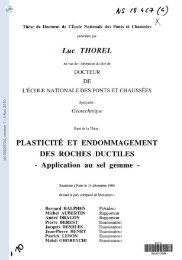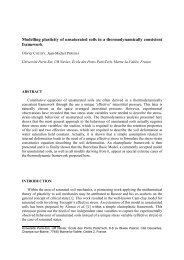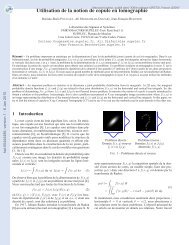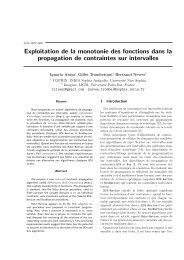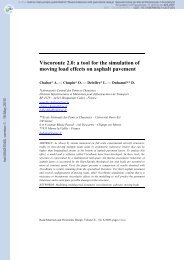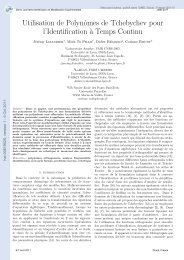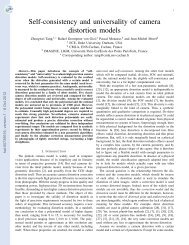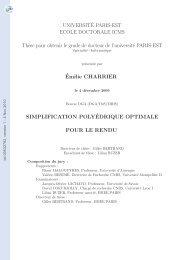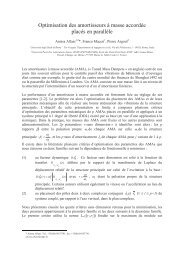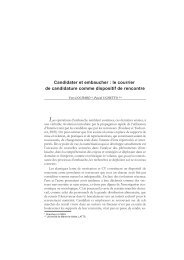MULTIVARIATE POLYNOMIALS IN SAGE
MULTIVARIATE POLYNOMIALS IN SAGE
MULTIVARIATE POLYNOMIALS IN SAGE
Create successful ePaper yourself
Turn your PDF publications into a flip-book with our unique Google optimized e-Paper software.
MULTIVARIABLE <strong>POLYNOMIALS</strong> <strong>IN</strong> <strong>SAGE</strong> 13<br />
One can specify which bases to use in the x variables and which bases to use in the y<br />
variables.<br />
hal-00824143, version 1 - 21 May 2013<br />
sage : Dx = D<br />
sage : Dy = D. base _ ring ()<br />
sage : Schubx = Dx. schubert _ basis _on_ vectors ()<br />
sage : Schuby = Dy. schubert _ basis _on_ vectors ()<br />
sage : pol = Schuby [2 ,1 ,3] * Schubx [1 ,1 ,2]<br />
sage : pol<br />
(Yy (2 ,1 ,3) )*Yx (1 , 1, 2)<br />
The expand function or all direct conversions are done in the x variables.<br />
sage : pol . expand ()<br />
(Yy (2 ,1 ,3) )*x(1 , 1, 2) + (Yy (2 ,1 ,3) )*x(1 , 2, 1) + (Yy (2 ,1 ,3) )*x<br />
(2 , 1, 1)<br />
sage : mx = Dx. monomial _ basis ()<br />
sage : mx(pol )<br />
(Yy (2 ,1 ,3) )*x[1 , 1, 2] + (Yy (2 ,1 ,3) )*x[1 , 2, 1] + (Yy (2 ,1 ,3) )*x<br />
[2 , 1, 1]<br />
But, of course, one can also easily change the basis for the y variables.<br />
sage : my = Dy. monomial _ basis ()<br />
sage : pol . change _ coeffs _ bases (my)<br />
(y [2 ,1 ,3]+ y [2 ,2 ,2]+ y [2 ,3 ,1]+ y [3 ,1 ,2]+ y [3 ,2 ,1]+ y [4 ,1 ,1]) *Yx (1 , 1,<br />
2)<br />
sage : pol = mx(pol ); pol<br />
(Yy (2 ,1 ,3) )*x[1 , 1, 2] + (Yy (2 ,1 ,3) )*x[1 , 2, 1] + (Yy (2 ,1 ,3) )*x<br />
[2 , 1, 1]<br />
sage : pol . change _ coeffs _ bases (my)<br />
(y [2 ,1 ,3]+ y [2 ,2 ,2]+ y [2 ,3 ,1]+ y [3 ,1 ,2]+ y [3 ,2 ,1]+ y [4 ,1 ,1]) *x[1 , 1,<br />
2] + (y [2 ,1 ,3]+ y [2 ,2 ,2]+ y [2 ,3 ,1]+ y [3 ,1 ,2]+ y [3 ,2 ,1]+ y [4 ,1 ,1]) *<br />
x[1 , 2, 1] + (y [2 ,1 ,3]+ y [2 ,2 ,2]+ y [2 ,3 ,1]+ y [3 ,1 ,2]+ y [3 ,2 ,1]+ y<br />
[4 ,1 ,1]) *x[2 , 1, 1]<br />
One can also change the role of variables between the main ones and the coefficients.<br />
sage : pol<br />
(Yy (2 ,1 ,3) )*x[1 , 1, 2] + (Yy (2 ,1 ,3) )*x[1 , 2, 1] + (Yy (2 ,1 ,3) )*x<br />
[2 , 1, 1]<br />
sage : pol . swap _ coeffs _ elements ()<br />
(x [1 ,1 ,2]+ x [1 ,2 ,1]+ x [2 ,1 ,1]) *Yy (2 , 1, 3)<br />
So we have seen that we can use our previous bases on a double set of variables. But<br />
we also have specific bases that only work with a double set of variables. Let us see the<br />
double Schubert polynomials and double Grothendieck polynomials, the way they were<br />
defined in Section 2.3.<br />
sage : DoubleSchub = D. double _ schubert _ basis _on_ vectors ();<br />
DoubleSchub



